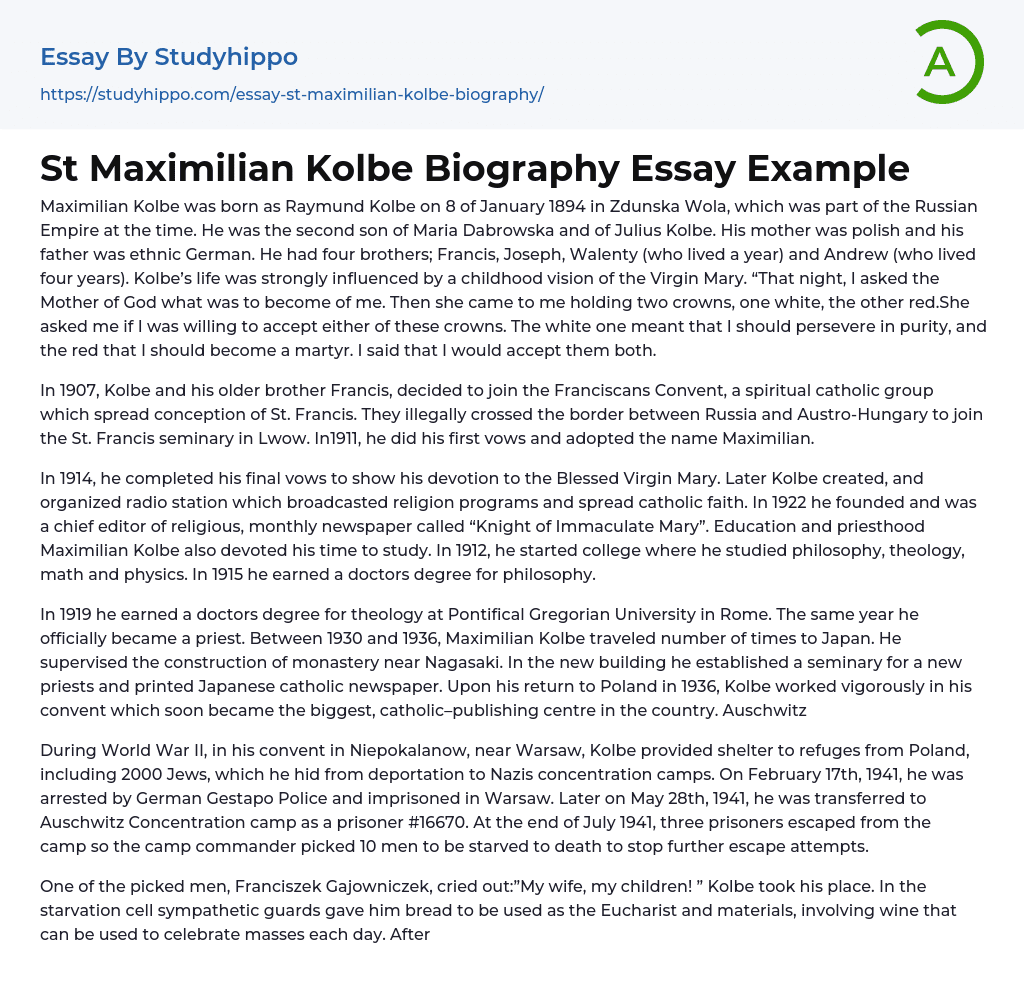Maximilian Kolbe was born as Raymund Kolbe on 8 of January 1894 in Zdunska Wola, which was part of the Russian Empire at the time. He was the second son of Maria Dabrowska and of Julius Kolbe. His mother was polish and his father was ethnic German. He had four brothers; Francis, Joseph, Walenty (who lived a year) and Andrew (who lived four years). Kolbe’s life was strongly influenced by a childhood vision of the Virgin Mary. “That night, I asked the Mother of God what was to become of me. Then she came to me holding two crowns, one white, the other red.She asked me if I was willing to accept either of these crowns. The white one meant that I should persevere in purity, and the red that I should become a martyr. I said that I would accept them both.
In 190
...7, Kolbe and his older brother Francis, decided to join the Franciscans Convent, a spiritual catholic group which spread conception of St. Francis. They illegally crossed the border between Russia and Austro-Hungary to join the St. Francis seminary in Lwow. In1911, he did his first vows and adopted the name Maximilian.
In 1914, he completed his final vows to show his devotion to the Blessed Virgin Mary. Later Kolbe created, and organized radio station which broadcasted religion programs and spread catholic faith. In 1922 he founded and was a chief editor of religious, monthly newspaper called “Knight of Immaculate Mary”. Education and priesthood Maximilian Kolbe also devoted his time to study. In 1912, he started college where he studied philosophy, theology, math and physics. In 1915 h
earned a doctors degree for philosophy.
In 1919 he earned a doctors degree for theology at Pontifical Gregorian University in Rome. The same year he officially became a priest. Between 1930 and 1936, Maximilian Kolbe traveled number of times to Japan. He supervised the construction of monastery near Nagasaki. In the new building he established a seminary for a new priests and printed Japanese catholic newspaper. Upon his return to Poland in 1936, Kolbe worked vigorously in his convent which soon became the biggest, catholic–publishing centre in the country. Auschwitz
During World War II, in his convent in Niepokalanow, near Warsaw, Kolbe provided shelter to refuges from Poland, including 2000 Jews, which he hid from deportation to Nazis concentration camps. On February 17th, 1941, he was arrested by German Gestapo Police and imprisoned in Warsaw. Later on May 28th, 1941, he was transferred to Auschwitz Concentration camp as a prisoner #16670. At the end of July 1941, three prisoners escaped from the camp so the camp commander picked 10 men to be starved to death to stop further escape attempts.
One of the picked men, Franciszek Gajowniczek, cried out:”My wife, my children! ” Kolbe took his place. In the starvation cell sympathetic guards gave him bread to be used as the Eucharist and materials, involving wine that can be used to celebrate masses each day. After two weeks of dehydration and starvation, only Kolbe remained alive. The Nazi guards wanted the bunker emptied, so they gave Kolbe lethal injection of carbon acid. The guards who were present, said that he raised his left arm and calmly waited for injection.
Maximilian Kolbe
died on August 14th, 1941. Canonization Father Kolbe was beatified by Pope Paul VI in 1967 at St. Peter Basilica, Rome, Italy. He was canonized as a martyr by Pope John Paul II on October 10th, 1982 with Franciszek Gajowniczek in attendance. Maximilian Kolbe Feast Day is celebrated on August 14th and he is patron saint of drug addicts, families, journalists, prisoners, amateur radio operators and pro-life movement. The Blessed Virgin Mary was always strongly presented in his life and is recognized as a symbol of his unconditional devotion.
- Baptism essays
- Holy Spirit essays
- Jesus Christ essays
- Adam And Eve essays
- Crucifixion Of Jesus essays
- Crusades essays
- Eucharist essays
- God The Father essays
- Pope essays
- Protestantism essays
- Christian essays
- Church essays
- Elizabeth essays
- Sacrament essays
- Catholic Church essays
- Lord essays
- Priest essays
- Protestant Reformation essays
- Actions essays
- Biography essays
- Helping Others essays
- Leader essays
- Mission essays
- Power essays
- Purpose essays
- Superhero essays
- Afterlife essays
- Atheism essays
- Bible essays
- Buddhism essays
- Christian Worldview essays
- Christianity essays
- Confession essays
- Cosmological Argument essays
- Deism essays
- Devil essays
- Existence of God essays
- Faith essays
- Freedom Of Religion essays
- God essays
- Hinduism essays
- Immortality essays
- Islam essays
- Jainism essays
- Jews essays
- Judaism essays
- Miracle essays
- Monk essays
- Monotheism essays
- New Testament essays




